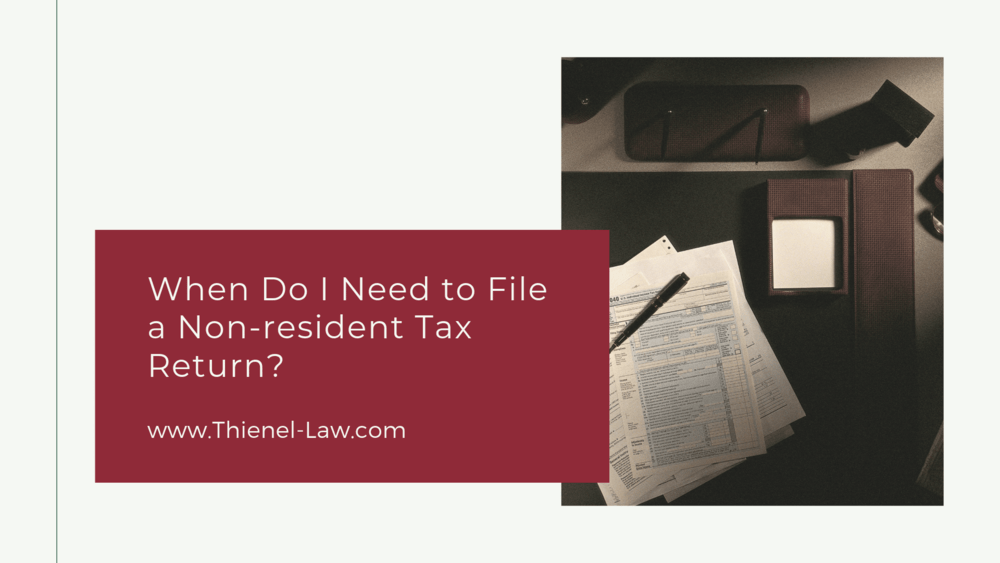When Do I Need to File a Non-resident Tax Return?
Individuals who work or live in Maryland are typically subject to state taxes based on their residency status. Therefore, your residency status can have a significant impact on whether you owe state income taxes. If Maryland demands you file a tax return and pay state income taxes even though you were not a resident, contact a Maryland tax attorney to discuss your options for challenging the state’s claim of residency.
Who is a Resident of Maryland for Income Tax Purposes?
The status of your residency directly affects whether Maryland requires you to file a state income tax return. The four categories of residency are:
Resident — A person who has a permanent home in Maryland. You may also be a Maryland resident for tax purposes if you maintained a home in Maryland for at least six months of the tax year and you were physically present in Maryland for at least 183 days or more during the tax year. Even if you have a permanent home in another state, if you meet the above criteria, you must file a full-year resident tax return.
Nonresident — An individual whose permanent home is in another state and who is not a statutory resident is a nonresident for tax purposes.
Statutory Resident — A person who maintains a place to live in Maryland for over six months during a tax year is a statutory resident for tax purposes.
Part-Year Resident — An individual who moves to Maryland or moves out of Maryland during the calendar year is a part-year resident for tax purposes.
Residents and Statutory Residents of Maryland are Expected to File Tax Returns
Usually Maryland requires a person to file a state tax return if that person meets these criteria:
A Maryland resident or statutory resident;
Who was required to file a federal tax return; and,
Had a gross income exceeding the maximum income limits based on age and filing status.
For example, the gross income level for a single person under the age of 65 years is $12,000 for 2018. If a single person earned less than $12,000 in 2018, that person might not need to file a state tax return. However, there are exceptions to the general rule. It is also important to note that a person may have to file a state tax return if the person’s gross income equals or exceeds the state income level based on the person’s age and filing status even though a federal tax return was not required.
If you are unsure whether you need to file a state tax return, it is in your best interest to seek advice from an experienced tax professional. Failing to file a state tax return could result in harsh penalties.
“ A person may have to file a state tax return if the person’s gross income equals or exceeds the state income level based on the person’s age and filing status even though a federal tax return was not required.”
Part-Year Residents File Part-Year Tax Returns
If an individual lives in Maryland for part of the tax year, he or she must file a part-year tax return using Form 502. If the person received income from a pension, a pension exclusion worksheet is required.
When is a Non-Resident Tax Return Required in Maryland?
Some individuals who are not residents of Maryland are required to file a nonresident tax return using Form 505 and Form 505NR. Individuals who do not meet one of the exceptions must report income generated from tangible property located in Maryland or business income, wages, and gambling winnings originating in Maryland. Exceptions include:
The person’s gross income is less than the minimum income level for the person’s filing status;
The income was not from a Maryland source; or,
The person is a Nonresident Working in Maryland, who lives in Virginia, Washington DC, Pennsylvania, or West Virginia and only earned wages in Maryland.
As with other situations, if you are unsure if you need to file a nonresident tax return, you may want to consult with a tax attorney to avoid harsh penalties. Penalties may include adding fees and interest to unpaid taxes owed. Another possible penalty is the suspension of your Maryland driver’s license. Some individuals may not be able to renew certain state-issued licenses if they fail to file a state tax return or pay state income taxes as required.
“If you are unsure if you need to file a nonresident tax return, you may want to consult with a tax attorney to avoid harsh penalties.”
Contact a Maryland Tax Attorney to Challenge Residency Status
If you do not file a state tax return, the Maryland Comptroller’s Office may send a letter requesting information about your residency to determine your status for filing a state income tax return. You can dispute the decision of the Comptroller’s Office if you believe you do not have to file a Maryland income tax return. However, disputing an incorrect residency status can be time-consuming and difficult.
A Maryland tax attorney is familiar with the evidence used to dispute residency status. An attorney also understands the factors and applicable laws used to determine your status for filing a Maryland state income tax return. Fighting state authorities on your own may cause costly penalties and interest besides your tax liability. Instead, rely on the experience, knowledge, skills, and resources of a Maryland tax attorney to challenge residency for a non-resident tax return. Contact Thienel Law today. Maryland tax attorney Steve Thienel is dedicated to assisting clients in Maryland, Virginia, and throughout the DC Metro area.

